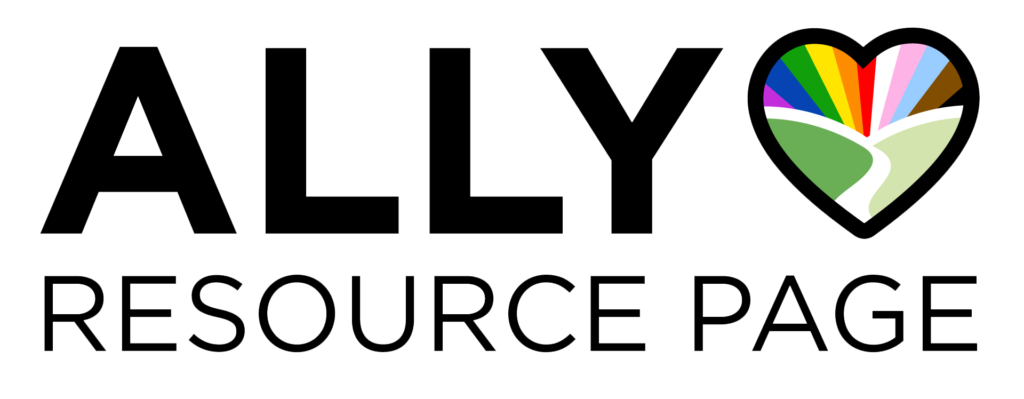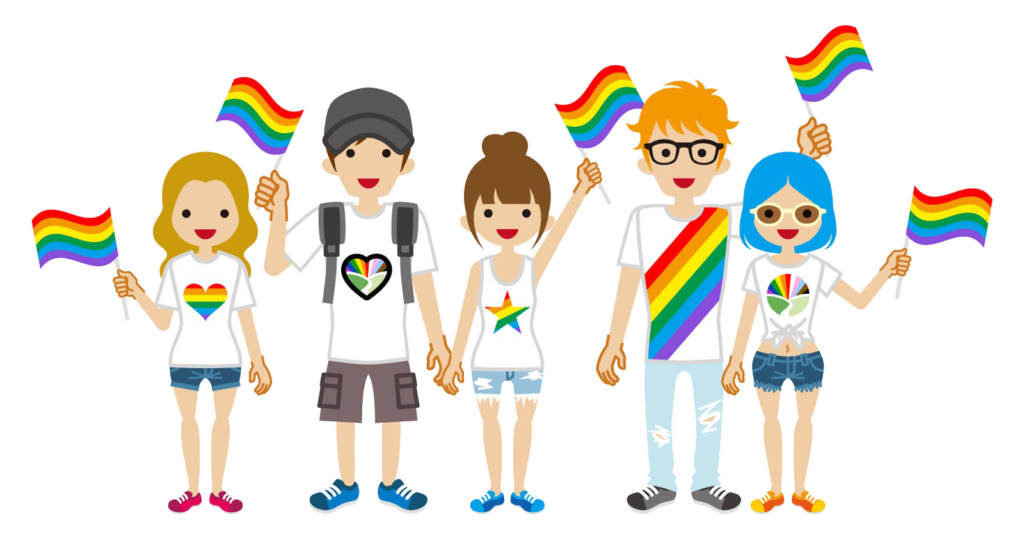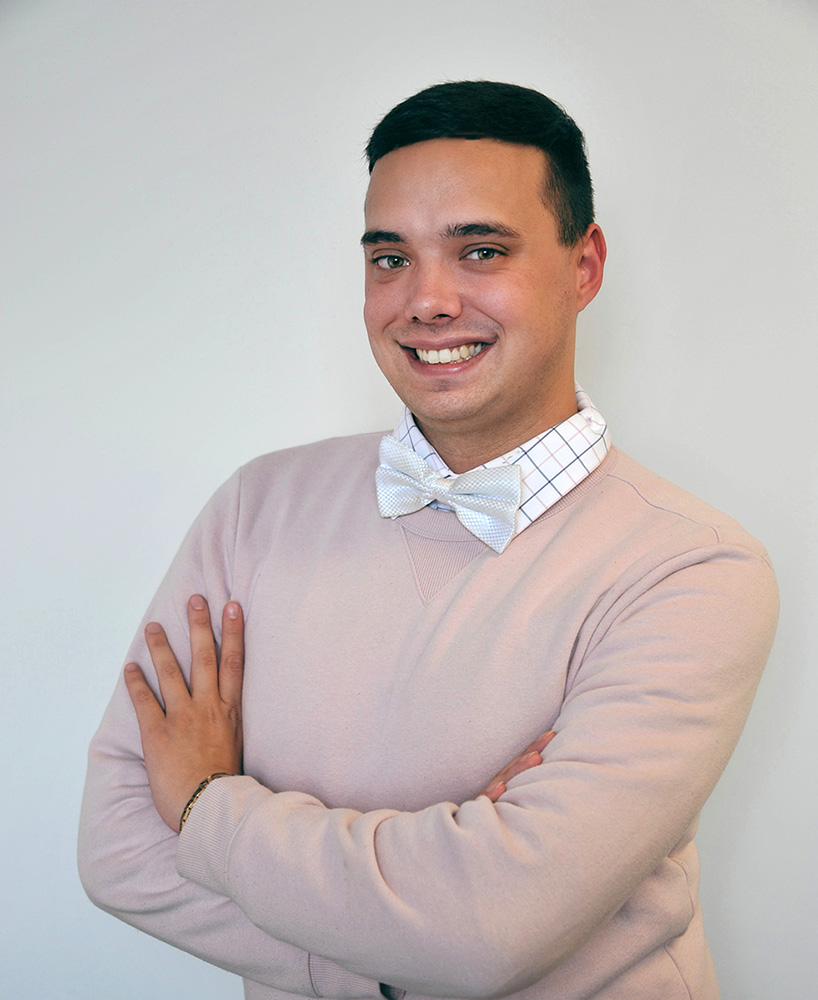Ally Resources
Ally Resources

The Importance of Being an Ally
Allyship is complex and deeply reflects a person’s values and beliefs, specifically their desire to understand and support a person who is different from themselves. People in the LGBTQA+ community face many different types of discrimination, injustice, social rejection, exclusion, and harm because their sexuality and/or gender identity are outside of heterosexual and cisgender social norms. When this mistreatment happens, allies can make a significant difference by helping people who are LGBTQA+ find support, love, understanding, acceptance, and other necessities. Regardless of a person’s sexuality and/or gender identity, anyone can be an ally to a person who differs from themselves in the LGBTQA+ community.
How a Person Becomes an Ally
Being an ally requires motivation and understanding. It means acknowledging and acting against the injustice that people in the LGBTQA+ community face. There is no magic wand or ceremony that makes a person an ally; rather, allyship is an ongoing process which may require us to unlearn problematic social behavior. As we learn what it means to be supportive, there are different ways to be an ally.

An Ally Can Be:
- A person who encourages, accepts, and empowers LGBTQA+ people by advocating for equal human rights and justice for all.
- A person who has sincere concerns about the safety and wellbeing of an LGBTQA+ person.
- A person who confronts the discrimination and sometimes complex challenges that LGBTQA+ people experience within society.
Allyship is about more than feeling upset by injustices. Being an ally requires action. It comes down to applying many different skills and practices.
Skills and Practices Include:
Remain Informed/Keep Up-to-date on Terminology: Allyship means holding ourselves accountable for our own knowledge and understanding. The LGBTQA+ community is growing and frequently changing. It is ok not to know everything, but we must make sure that we are doing the best we can to understand the basics. As a crucial example, we should know the difference between sexual orientation and gender identity, follow current LGBTQA+ related news and issues, and know what the letters for LGBTQA+ represent.
Reminder: You can ask questions to help improve your knowledge. However you can also conduct some of your own research to find the answers you are looking for. Be honest about what you don’t know and use that as a starting point to learn more. Some common questions an ally may think about are as follows:
Q. How do you know when to ask a question?
A. Someone might not know when to ask questions. It is understanding when it’s the appropriate time, place, and environment to ask questions that may be personal or private. Read the room and see if it is ok to ask a question. Most spaces with a lot of people may not be the right place to ask questions because someone may not be out or might not have time at that moment.
Q. How do you know who to ask the question to?
A. Asking a person a question can be based on the relationship you have with that person. If you feel comfortable with the person, feel free to ask, or if you’re unsure, simply ask if you can talk to them about questions you have.
Q. How about what questions not to ask such as inappropriate questions?
A. There are a lot of questions a person has; however, there are some questions that can be disrespectful and inappropriate to ask. Read more on this topic here or in this other piece on inappropriate questions.
Q. When should you do the research instead?
A. A person can research anytime, especially if you are interested in learning about something on your own. Please see the reference page below.
Calling In and Speaking Up: Whether an LGBTQA+ person is around or not, an ally can still use their voice to speak up in response to another person’s ignorance or hate towards the LGBTQA+ community. This does not always have to be done with anger or aggressiveness. An ally can create a dialogue and conversation to call in people to inform others how to be respectful, such as when a person may have used the wrong pronoun, or made false assumptions about a person’s sexuality or gender identity. Calling in people, rather than calling them out, is inviting someone to have a dialogue about their actions to learn and not belittle them. Think of calling in as asking someone to step aside to have a private conversation about what was said.
Reminder: A person may feel apprehensive or awkward to speak up sometimes. There can also be fear of not wanting to say something offensive or make a situation worse. Being an ally is not always easy, but it is necessary to help people in the LGBTQA+ community who might not be able to speak up for themselves.
Creating Space: Using your voice to speak up is one way to be heard. Another way to show allyship is by creating space and providing a platform for LGBTQA+ people to speak up. Sometimes LGBTQA+ people need to be included in a conversation but don’t have a way in. A form of allyship is creating space for the people being excluded. This enables them to speak for themselves and their own needs without someone else speaking on their behalf.
Reminder: Provide people space to speak up about their own experience and community; however, if they do not feel comfortable, do not press the issue. Sometimes LGBTQA+ folks may not feel welcomed in a space if it seems unfriendly towards the LGBTQA+ community. This could be based on the space having no visible support or a place that has had negative reactions to LGBTQA+ people in the past. Please keep in mind that just because someone identifies as LGBTQA+ does not mean that they want to be the designated spokesperson on LGBTQA+ issues at work, school, etc.
Be Honest: As an ally, it is essential to be honest with yourself about your own values and how well you understand the LGBTQA+ community.These feelings and thoughts are important because, as an ally, you can better recognize when you want to step in and speak up or when you may not feel comfortable doing so. Allyship is not easy; honesty and communication with family members, friends, and colleagues who are LGBTQA+ can teach a person how to best support an LGBTQA+ person and strengthen the relationship.
Reminder: Occasional disagreements are normal and understandable as you work on becoming a better ally. This page is a guide and resource; however, it is not the perfect answer to how you can be an ally for each individual within the LGBTQA+ community. Honest and open communication is key to building and strengthening your relationships with LGBTQA+ individuals.
Support Equality & Equity: Being an ally means supporting policies at local, state, or federal levels that help protect LGBTQA+ individuals from discrimination and mistreatment. A person can also work to change or create policies to advocate for and in support of the LGBTQA+ community.
Reminder: Sometimes people may not understand how impactful an issue is to an LGBTQA+ person because of their privilege. Creating or amending existing policy, such as changing language or clarifying meaning, can significantly impact an LGBTQA+ person. For example, creating and implementing an antidiscrimination policy at work can show that LGBTQA+ individuals are supported regarding their identities.
Be a Proud Ally: A person who is an ally should be proud of their ally identity and express their support for the LGBTQA+ community. An ally can show support online, in conversation, or by hanging Pride flags in their room, home, or office. Having visible signage like Pride flags is an effective and meaningful way to show support but not required to be an ally–It’s what you do or how you behave that matters most!
Reminder: There is no perfect ally, and all you can do is try your best. It will take time, energy, and dedication to continue being an ally. Be proud of the work you do to help others, which includes people who you might not even know!
Being an LGBTQA+ Savior vs. Being an Ally
Being an ally does not mean that queer individuals need saving or can’t stand up for themselves. There is a difference between being an ally and feeling that an LGBTQA+ person needs to be saved from social views. Being an ally is using one’s privilege to support, advocate for, and empower people who may not have access to the areas needed to speak up for themselves. Check out this link to understand more about the difference.
Allyship Related to Sexuality
Being an ally to those who are not heterosexual, such as gay, lesbian, pansexual, bisexual, or asexual, means a person acknowledges the injustice that people of other sexualities face. The following are social issues that LGBTQA+ people face related to a person’s sexuality:
- Heterosexism and Heteronormativity: This is the assumption that everyone is or should be straight/heterosexual.
- Biprejudice or Biphobia: These are harmful stereotypes and preconceived ideas about bisexual people.
- Homomisia (Homophobia): This is when a person is being verbally or physically violent or hostile towards the LGBTQA+ community.
How to be an Ally Regarding Sexuality
- Not outing someone (sharing their sexual orientation without consent).
- Respecting a person’s sexual and romantic orientation.
- Not placing heteronormative expectations on a person such as questioning a couple like, “Which one is the man and which one is the woman?”
- Not assuming everyone is heterosexual.
Allyship Related to Gender Identity
Being an ally to those who are not cisgender, such as nonbinary, transgender, agender, genderqueer, or gender non-conforming, etc., means a person acknowledges the injustice that people of other gender identities face. The following are social issues that transgender and non-binary people face:
- Transprejudice: Harmful, preconceived ideas about transgender and nonbinary people.
- Tranmisia (Transphobia): This is when a person is being verbally or physically violent or hostile towards the transgender and nonbinary community because of who they are.
- Cisnormativity: This is the assumption that everyone is or should be cisgender.
- Cisgender Privilege: Unearned advantages you receive when your gender identity matches your sex assigned at birth.
How to be an Ally Regarding Gender Identity
- Shut down conversations that use a person’s birth name (dead name) instead of their chosen name.
- Respect a person’s gender, name, and pronouns.
- Avoid cisnormative compliments and opinionated tips i.e. “I would have never known you were transgender” or “You’d pass so much better if you wore less/more make-up or had a better wig.”
- Use gender-neutral language if you don’t know a person’s gender identity.
Making a Mistake
Many people rarely intend or desire to hurt people when attempting to be an ally. Common unintentional mistakes are;
- Forgetting a person’s pronouns or using the wrong ones.
- Assuming a person is heterosexual.
- Using their birth name (dead name) instead of their chosen name.
- Comparing heterosexual relationships to queer relationships, such as preconceived gender roles.
- Misgendering a person.
In these moments, a person needs to understand that it’s ok to make a mistake and it takes time to learn. The following are reminders to continue the work required to be an ally while acknowledging mistakes:
- Hold Yourself Accountable: Recognize what you said was wrong or incorrect and acknowledge that a mistake was made.
- Listen Actively: When a mistake is made and someone is willing to correct you, it is essential to listen to what they are saying and understand what happened to correct the mistake.
- Commit to Improve: Take the initiative to learn and strive to make sure the same mistake will not happen again. While this may not always be possible, it is good to have confidence in yourself and do better.
- Do Not Make It About You: Often when a person makes a mistake, they feel defensive or embarrassed which puts up barriers to learning. Understand that people make mistakes, but the mistake affected another person. It’s important to make sure the person affected is ok or talk to them later about it if possible to offer support and check in.
- Apologize and Move On: Many times, it is as simple as a quick apology and correcting the behavior in the moment immediately.
Being an ally is a lot of work but it can become easier if we take the time to learn and grow with respect for all LGBTQA+ people.
For some reminders to take with you, download these 5 “Reminders of How to be an LGBTQA+ Ally” below.
References
- https://www.glaad.org/transgender/allies
- https://guides.rider.edu/c.php?g=926249&p=6679325
- https://projecthumanities.asu.edu/content/cisgender-privilege-checklist
- https://lgbtfunders.org/resources/issues/transgender-issues/
- https://www.kent.edu/lgbtq/pros-and-cons-being-ally
- https://www.thetrevorproject.org/resources/trevor-support-center/a-guide-to-being-an-ally-to-transgender-and-nonbinary-youth/
- https://uh.edu/lgbtq/resources/_files/guidelines-to-being-an-ally.pdf
- https://www.throughthewoodstherapy.com/5-common-mistakes-made-by-well-meaning-allies/

About the Author
Jacob P. Kelley is a nonbinary and queer sexual, who is a queer inclusive sex educator. They are driven by wanting to help people live their fullest and most authentic lives. Mx. Kelley has their M.Ed. from Widener University and they are a local community educator in Northeastern Pennsylvania. They are a local NEPA Drag Queen known as Trixy Valentine, who is a former Ms. NEPA PrideFest 2019 and 2020. Mx. Kelley has an online presence called Jacob Kelley Queer Education along with an educational video series known as Juicy with Jake.
Follow on Facebook and Instagram @JacobKelleyQueerEducation
